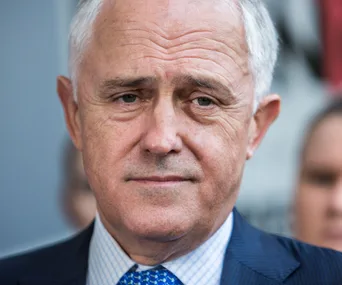In comparison to the Turnbull Government’s focus on the economy this election, the Shorten Opposition’s pitch to women is about fairness and “putting people first”.
This is partly because the Labor Party traditionally believes government funding for the services people depend upon, like health and education, is just as important as having a strong economy.
But Labor also hopes that, when it talks about fairness, voters will be reminded of the unfair budget that Tony Abbott delivered in 2014.
That was the budget where Abbott broke a pile of election promises and then increased costs or reduced payments for students, the elderly, the unemployed and the sick, while doing very little to make the wealthy pay their fair share.
When Labor leader Bill Shorten and his team talk about fairness, they want voters to be worried that if Malcolm Turnbull is re-elected, he might also break his election promises and turn out to be just like Tony Abbott.

Shorten introducing the same-sex marriage bill to federal parliament.
Apart from trying to scare voters away from the Government, the Opposition is also trying to lure them to Labor. According to one opinion poll, Labor has been very successful in getting men to switch their vote from the Government to the Opposition. But when women are abandoning Turnbull’s team, they are going to the Greens and other parties as well as Labor.
What’s more, three in ten Australian women haven’t yet decided which party they prefer.
This means Labor has to capture the hearts and minds of a lot more women if it is to win the July election.
So what does the alternative government have to offer us?
For women with families, Labor has promised to deliver increases in funding for education and health promised by Julia Gillard when she was prime minister.
In fact, education is the central theme of Labor’s election pitch. It’s an expensive commitment that aims to fund every school according to the needs of its students.
Labor has also promised that computer programming will be taught in all schools, teachers will get better qualifications in science, technology, engineering and maths, and there will be additional support for Indigenous students and students with disabilities.
There’s also program to help young people in areas with high unemployment get into work.
In health, Labor has committed to lift the freeze on Medicare rebates that doctors say is putting pressure on them to give up bulk billing, scrap a plan to increase prescriptions by $5, improve the system for helping people with mental health issues, and fund local initiatives aimed at reducing suicides.

Three in ten Australian women haven’t yet decided which party they prefer.
When it comes to Australia’s working women, Labor’s election commitments focus on those at the lower end of the pay scale. The Opposition promises to crack down on employers who exploit workers, as well as those who re-arrange their businesses to avoid paying out employees when a business shuts down.
Under Labor, new mothers can receive paid parental leave from their employer in addition to payments from the Government.
Labor also has additional funding for women experiencing family violence, including more funds for legal services, grants to help women be safer at home, and better information sharing between the police, courts, child protection and other government agencies. It has also committed to introducing five days’ paid leave for people who experience domestic or family violence.
If this sounds like a lot of spending, it is. The Opposition says it will pay for its promises by making big business and high-income earners pay more tax, scrapping negative gearing for established homes, and not going ahead with some of the Government’s election commitments such as the company tax cut.
But at the end of the day, Labor says some types of spending, like health and education, are more important than balancing the budget.
It will be in the hands of female voters on election day to say whether Labor is right.



